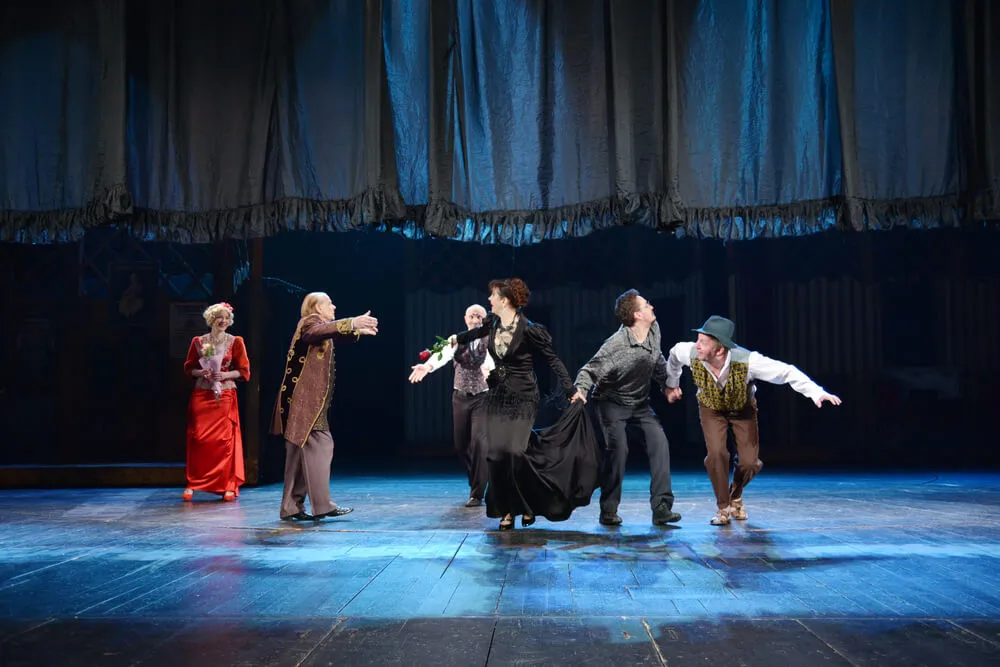
Acting
Overview
Acting BA (Hons) courses typically begin with the basics of acting. It offers massive knowledge through training in the art of performance, including techniques, theory, and practical application.
International students will develop essential skills such as character analysis, improvisation, voice and movement training, and auditioning techniques.
Objectives
- Develop character analysis, improvisation, and scene study.
- Understand acting techniques and theories.
- Gain practical experience through performance and industry connections.
- Prepare for a successful career in theatre, film, or TV.
Prerequisites
- Passion for acting and performing arts.
- Strong communication and interpersonal skills.
- Willingness to commit to rigorous training and practice.
Curriculum Outline
- Acting techniques (e.g., Stanislavski, Meisner, Michael Chekhov)
- Scene study and analysis
- Voice and speech training
- Movement and physicality
- Improvisation
- Auditioning techniques
- Theatre history and theory
- Performance opportunities (e.g., plays, showcases)
Teaching Method
- Practical workshops and exercises
- Group discussions and critiques
- Individual coaching and mentoring
- Guest lectures from industry professionals
- Acting lab
- Collaborative projects
- Embodied training: movement, voice, improvisation and digital technologies
- Group and individual tutorials
- Independent study and rehearsals
- Lectures and visiting speaker talks
- Practical performance projects
- Production meetings
- Staff and student-led seminars and discussions
- Studio, external venue and other visits
Modules
- Acting Fundamentals
- The Playful body
- Actor's Toolkit 1
- Voice and Speech
- Movement and Physicality
- Improvisation
- Performance Festival 1
- From Grave to Stage
- Acting in Digital Worlds
- Actor's Toolkit 2
- Performance Festival 2
- Going Solo
- Collective Encounters
- Auditioning Techniques
- Theatre History and Theory
- Professional Production and Showcase
- Performance Projects
Assessment Methods
- Practical assessments (e.g., scene performances, monologues)
- Written assignments (e.g., character analysis, script breakdowns)
- Group projects (e.g., collaborative performances)
- Final examinations (e.g., comprehensive assessments)
- Assessment and progress tutorials
- Critical and creative portfolios - workbooks and reflective journals
- Essays
- Live presentations – performances, pitches, proposals, papers
- Performance analysis of live theatre and digital screenings
- Performance and video essays
- Podcasts
- Production roles and ensemble contribution
- Project proposals, plans and reports
- Written and performed dissertations
Course Duration
This programme may vary depending on the institutions and countries, but the general standard options in the UK are:
- 03 years full-time.
- 04 years full-time with a placement.
- 05 years part-time
Facilities
- Well-equipped rehearsal studios.
- Costume and prop workshops.
- Extensive acting and performing arts libraries.
- Rehearsal rooms and fully equipped performance spaces.
- Provides sector-leading spacious studios.
- Access to industry professionals and guest lecturers.
Career Pathways
- Actor in theatre, film, television, or other media
- Acting teacher or coach
- Theatre director or producer
- Casting director
- Stage Combat Instructors
- Voice Over Specialists
- Dramaturg
- Scriptwriter
- Storyteller
- Stage manager
- Entertainment agent
- Arts administrator
- Running own theatre companies
Fees and Fundings
- Tuition fees between £15,000-£25,000 per year.
- Scholarships, grants, and bursaries may be available to help offset costs.
- Part-time work or student loans can also be considered.
Entry Requirements
This course may vary depending on the specific programme and institution, but the standard minimum entry requirements are:
- 2 A Levels at grade C or above
- Foundation Diploma in Acting, Performance, or Art and Design
- Merit, Pass, Pass (MPP) at BTEC Extended Diploma
- Pass at UAL Extended Diploma
- Access to Higher Education Diploma or equivalent EU/International qualifications
- 3 GCSE passes at grade 4 or above
- English language requirements
Field Work and Internships
- Opportunities for practical experience through internships, workshops, and community theatre productions.
- Networking with industry professionals can lead to future career opportunities.
Certifications
Certifications can demonstrate specialised skills and enhance career prospects. Examples include:
- Certified Acting Teacher (CAT)
- Certified Theatre Director (CTD)
- Certified Casting Director (CCD)
- Certified Stage Manager (CSM)
- Certified Dramaturg (CD)
Intakes
Typically, it takes twice a year (fall and spring), but may vary like:
- Fall (September/October)
- Spring (January/February)
- Summer (May/June)
Student Testimony
"The tutors and my classmates became family, and those who taught me made my time extraordinary. Thanks to them, I am the actor and woman I am today," says - "Lucy Tebb, BA (Hons) in Professional Acting."
Frequently asked questions
Following are the prerequisites for the acting programme:
- A passion for acting and performing arts.
- Strong communication and interpersonal skills.
- Willingness to commit to rigorous training and practice.